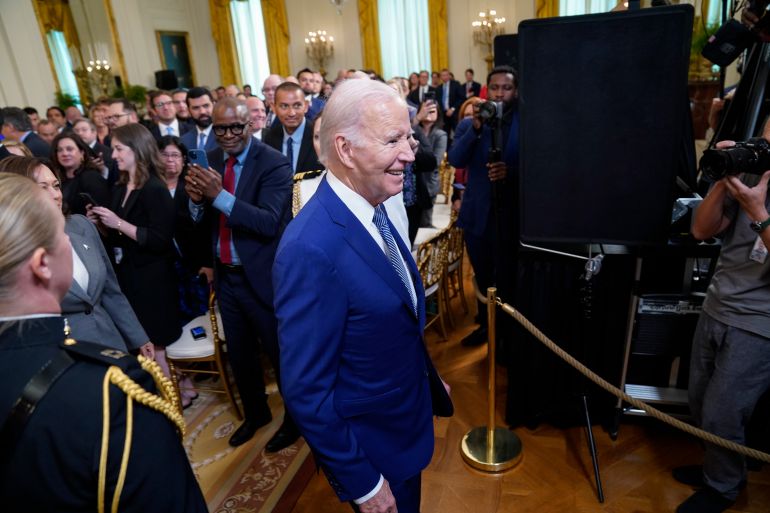Biden says US, NATO had no involvement in Wagner uprising
US president says NATO allies made sure there was ‘no excuse’ for Russia to blame the Wagner Group rebellion on the West.

United States President Joe Biden has said that Washington and NATO had no involvement in an armed uprising against the Kremlin incited by Yevgeny Prigozhin, leader of the Wagner Group of mercenaries.
Speaking on Monday, Biden said he has spoken with “key allies” in the wake of the events. They agreed it was important to give Russian President Vladimir Putin “no excuse to blame this on the West”.
Keep reading
list of 3 itemsWhat next after Wagner mutiny?
Russia’s ‘internal affair’: China plays down Wagner mutiny impact
“We made clear that we were not involved, had nothing to do with it. This was part of a struggle within the Russian system,” Biden said.
“We’re gonna keep assessing the fallout of this weekend’s events and the implications for Russia and Ukraine,” he told reporters. “But it’s still too early to reach a definitive conclusion about where this is going.”
Biden’s comments came after a weekend of instability in Russia. On Friday, Prigozhin — an erstwhile Putin ally — accused Russian Defence Minister Sergei Shoigu of launching rocket attacks on his mercenary forces in Ukraine, calling for an end to the “evil” of Russia’s military leadership.
It was a major escalation in the ongoing war of words between Prigozhin and the Kremlin, whom he accused of mistreating his fighters in Ukraine. Soon after, the Kremlin announced it had opened a criminal case against Prigozhin for armed rebellion.
By Saturday, Prigozhin had ordered his men to cross from Ukraine into Russia, to confront Russia’s military leadership in what he called a “march for justice”. The next hours saw Wagner forces seize the southern city of Rostov-on-Don and begin an advance towards Moscow, with Prigohzhin demanding the removal of Defence Minister Shoigu.
Putin, meanwhile, accused Prigozhin of “treason” and a “stab in the back”.
Then, just as quickly as the uprising began, it ended. The office of Belarusian President Alexander Lukashenko announced a deal had been brokered with Prigozhin, and that Wagner forces would stand down.
Further details of that deal have yet to emerge.
Prigozhin, for his part, relocated to Belarus, where on Monday, in his first public statement since the uprising, he said his fighters had come within 200km (124 miles) of Moscow.
However, he maintained the fighters “did not have the goal of overthrowing the existing regime and the legally elected government”. He added his forces turned around to “not shed Russian soldiers’ blood”.
Long-term fallout from the weekend’s events — and their impact on Russia’s war in Ukraine — remain unclear. Wagner forces had previously played a key role in the fighting, particularly in capturing the eastern city of Bakhmut.
Speaking to reporters on Monday, State Department spokesman Matthew Miller noted “it remains a dynamic situation” and it is unclear what the “ultimate implications” will be for US interests.
Still, he added: “It is certainly a new thing to see President Putin’s leadership directly challenged.”
The statement echoed the words of US Secretary of State Antony Blinken, who on Sunday said the rebellion exposed “real cracks” in Putin’s government.
As the events unfolded on Saturday, President Biden discussed the situation with French President Emmanuel Macron, German Chancellor Olaf Scholz and United Kingdom Prime Minister Rishi Sunak, according to the White House.
On Sunday, he also spoke with Canadian Prime Minister Justin Trudeau “as part of his close coordination with allies and partners following recent events in Russia”, the White House said.
“As you know, the president very keenly tracks foreign policy developments around the world. His national security team was giving updates literally hour by hour throughout the weekend,” White House National Security Council spokesperson John Kirby said on Monday. “He was absorbing all that information and making sure that — in the context of absorbing it — he was also sharing perspectives with allies and partners.”
Biden also told reporters on Monday that he “spoke at length” with Ukrainian President Volodymyr Zelenskyy, pledging the US’s continued support as Ukraine fights off invasion by Russia.
“He and I agreed to follow up and stay in constant contact,” Biden said.